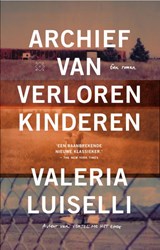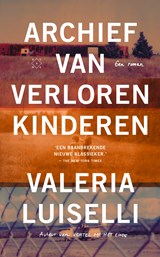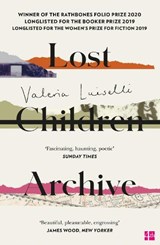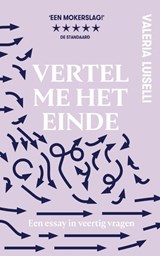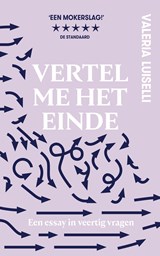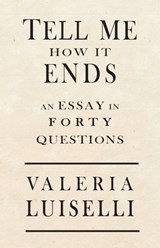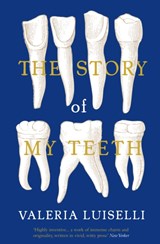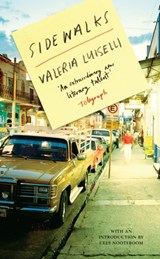Boredom and indifference erode our humanity
29 april 2019Afgelopen vrijdag 19 april spraken we met writer in residence Kate Mosse over de Women's Prize, waarvan zij een van de iniatiefnemers is, en droegen twee critici, een uitgeefster en een vertaalster een boek voor voor de shortlist - die vandaag bekendgemaakt wordt. We publiceren vandaag Nicolette Hoekmeijers laudatio voor Valeria Luiselli's Lost Children Archive. Een verhaal over excellentie, verveling en empathie.
N.B. Eerder bespraken we de roman, en De gewichtlozen en Valse papieren, en publiceerden we voor uit De geschiedenis van mijn tanden en De gewichtlozen. Valse papieren was een van de tien favorieten van Niña Weijers, en we publiceerden een verhaal van Luiselli, 'De theorie van het haar'.
Kate Mosse, ladies and gentlemen, good evening. I’m Nicolette Hoekmeijer. Together with my colleague Molly van Gelder I ‘ve translated Valeria Luiselli’s novel Lost Children Archive.
Many clever and insightful reviews have been published in these last weeks, in which Lost Children Archive is rightfully praised. In The Guardian Emma Brocks describes it as ‘a wonderfully subtle story in which the experience of migrant children is filtered through the delicate, funny, effortlessly poetic account of a family’s road trip from New York to the Mexican border.’
Tommy Orange (it’s not entirely accidental that I quote him, in the context of this evening for the Women’s Prize for Fiction, formerly known as the Orange Prize) called the novel ‘impossibly smart, full of beauty, heart and insight’.
It’s hard for me to surpass those eloquent laudations. So I would like to focus on an altogether different aspect of this novel: Boredom.
Perhaps not the most obvious recommendation for a literary prize, but bear with me…
A blended family drives from the east coast to the Mexican border. The journey takes weeks. On the backseat are the kids, aged 5 and 10.
I am part of the pre-Easyjet generation and I know what it is like to be a kid on the backseat of a car, driving for days to the South of France. It’s plain boring. But that was only for three days. And my parents were in a happy holiday mood. In this novel the kids’ boredom is made worse by the parents being obsessed with themselves, with their sound documentation projects and their troublesome marriage.
But it is exactly in this feeling of boredom that Luiselli shows her literary genius. In itself it is not so hard to convey a sense of boredom. (I’ve got five minutes, here, tonight – I think I could do it…) But Luiselli manages to evoke a sense of oppressive boredom which is electrifying, which keeps us continually on edge, eager for more.
And she does so by very cleverly making the car, in all its stillness, into the control room, so to speak, of the novel. Little by little, she lets the outside world enter this safe, enclosed environment.
To this end she uses various means: radio reports on the harrowing reality of unaccompanied minors trying to cross the desert, imaginary games, stories from different times and realities, sound recordings, voices from the Apache past, quarrels of a disintegrating marriage, audiobooks. And last but not least there are the bemused thoughts, the witty and endearing remarks of the two small children in the back, who try to get a grip on an unimaginable reality.
For me this is vintage Luiselli, doing two things at the same time: making us experience boredom but at the same time having us continually on edge. We are hurled back and forth between stillness and great speed. She sketches the grim reality of the child refugee crisis, but at the same time breaks the tension by shifting perspective to the innocence and naivety on the backseat – thus preventing the book from becoming too dark and ponderous. She uses the car to grant her readers some breathing space, which makes the reality outside all the more gripping.
To me this sense of boredom also functions on a deeper level: as a reflection on the way society deals with the global refugee crisis. From within our safe and privileged position, in this case embodied by the car, we have the luxury of keeping reality at a distance, being at times detached and uncaring.
Because yes, of course we are all touched by the border crisis, by the suffering of others – but only at moments, just like the reality enters the Luiselli family car at certain moments. More often than not we close our eyes to the reality, as we want to get on with our own lives. We are dulled by all the horrible news, the atrocities. Maybe this is not boredom per se, but rather indifference.
A quote from the novel:
‘“Inside the car, although we all sit at arm’s length from one another, we are four unconnected dots,” she thinks, “each in our seat, with our private thoughts, each dealing with our varying moods and unspoken fears.”’
With this call for compassion Luiselli is matching personal and political by giving us no other option then to acknowledge our own role, both as an individual and as a society. She makes us realize that indifference erodes our humanity. We are forced to look into our own soul, which I think is something only great literature can accomplish.
And from my own, very personal position as a translator the concept of boredom functions on yet another level: as a touchstone of literary quality. The Luiselli family is in the car for some four or five weeks. Say two hundred pages. As a reader you may be in the car with them for, let’s say… eight hours? But as a translator I’ve been with them in this car for several months, and I’ve made the same trip at least four times, in revising. I acutely felt their boredom, but without being bored myself.
I wouldn’t hesitate for one second to get into the car once more with this family that stole my heart.
Nicolette Hoekmeijer is docent aan de Vertalersvakschool in Amsterdam en vertaalde eerder onder andere werk van Kiran Desai, Edwidge Danticat, Edward St. Aubyn en Nathan Englander. Ze schreef voor Athenaeum.nl over haar vertalingen van Jess Walter (Het nulpunt en Schitterende ruïnes), Maggie Nelson, David Bezmozgis en Toni Morrison.


